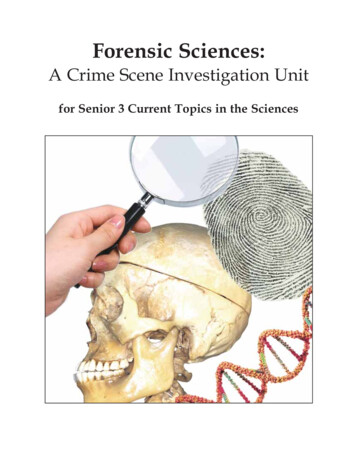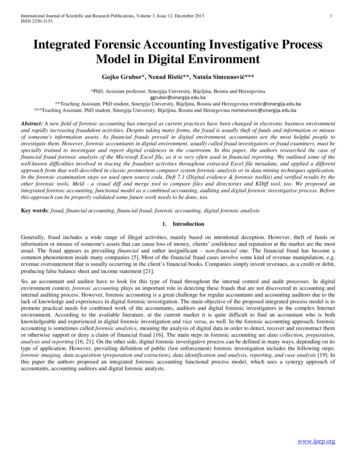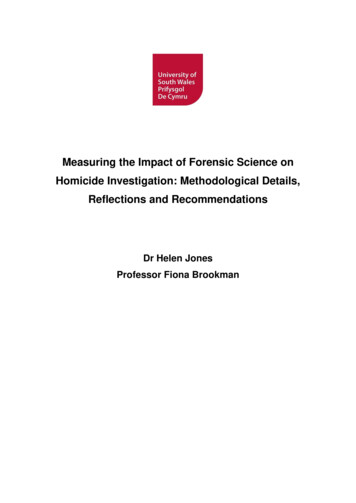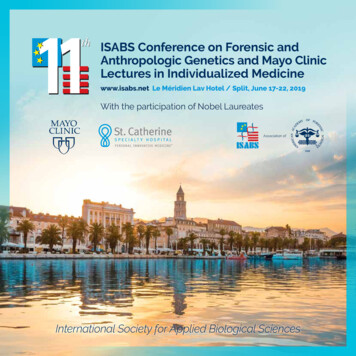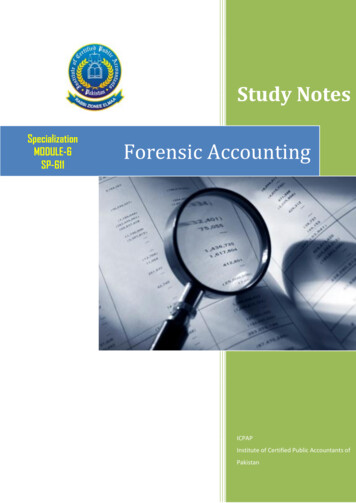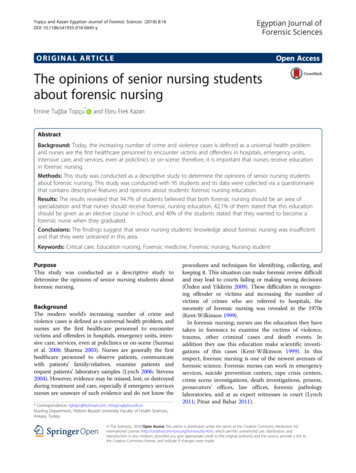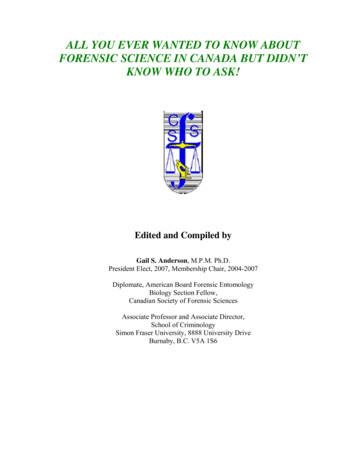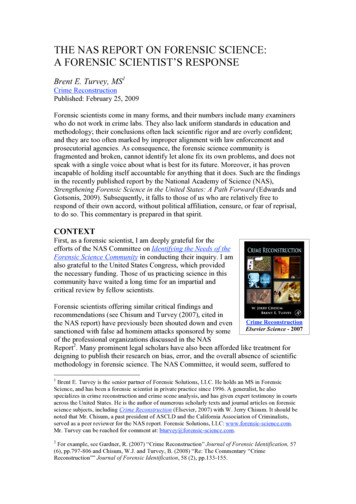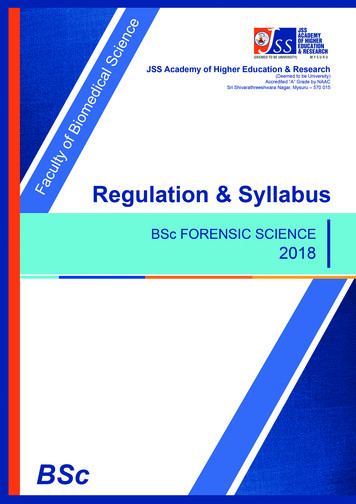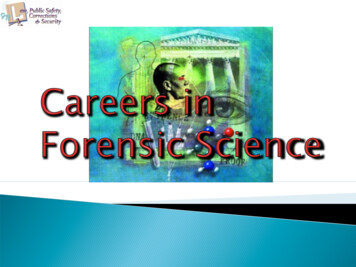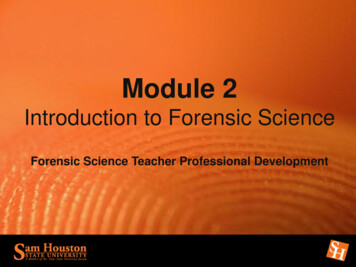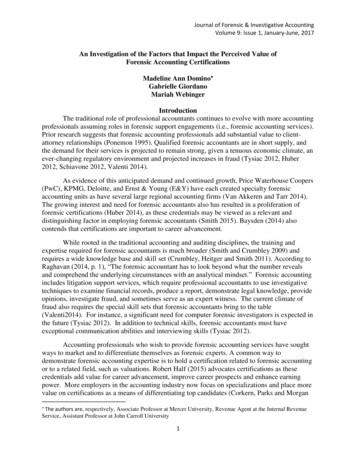
Transcription
Journal of Forensic & Investigative AccountingVolume 9: Issue 1, January-June, 2017An Investigation of the Factors that Impact the Perceived Value ofForensic Accounting CertificationsMadeline Ann Domino Gabrielle GiordanoMariah WebingerIntroductionThe traditional role of professional accountants continues to evolve with more accountingprofessionals assuming roles in forensic support engagements (i.e., forensic accounting services).Prior research suggests that forensic accounting professionals add substantial value to clientattorney relationships (Ponemon 1995). Qualified forensic accountants are in short supply, andthe demand for their services is projected to remain strong, given a tenuous economic climate, anever-changing regulatory environment and projected increases in fraud (Tysiac 2012, Huber2012, Schiavone 2012, Valenti 2014).As evidence of this anticipated demand and continued growth, Price Waterhouse Coopers(PwC), KPMG, Deloitte, and Ernst & Young (E&Y) have each created specialty forensicaccounting units as have several large regional accounting firms (Van Akkeren and Tarr 2014).The growing interest and need for forensic accountants also has resulted in a proliferation offorensic certifications (Huber 2014), as these credentials may be viewed as a relevant anddistinguishing factor in employing forensic accountants (Smith 2015). Baysden (2014) alsocontends that certifications are important to career advancement.While rooted in the traditional accounting and auditing disciplines, the training andexpertise required for forensic accountants is much broader (Smith and Crumbley 2009) andrequires a wide knowledge base and skill set (Crumbley, Heitger and Smith 2011). According toRaghavan (2014, p. 1), “The forensic accountant has to look beyond what the number revealsand comprehend the underlying circumstances with an analytical mindset.” Forensic accountingincludes litigation support services, which require professional accountants to use investigativetechniques to examine financial records, produce a report, demonstrate legal knowledge, provideopinions, investigate fraud, and sometimes serve as an expert witness. The current climate offraud also requires the special skill sets that forensic accountants bring to the table(Valenti2014). For instance, a significant need for computer forensic investigators is expected inthe future (Tysiac 2012). In addition to technical skills, forensic accountants must haveexceptional communication abilities and interviewing skills (Tysiac 2012).Accounting professionals who wish to provide forensic accounting services have soughtways to market and to differentiate themselves as forensic experts. A common way todemonstrate forensic accounting expertise is to hold a certification related to forensic accountingor to a related field, such as valuations. Robert Half (2015) advocates certifications as thesecredentials add value for career advancement, improve career prospects and enhance earningpower. More employers in the accounting industry now focus on specializations and place morevalue on certifications as a means of differentiating top candidates (Corkern, Parks and Morgan The authors are, respectively, Associate Professor at Mercer University, Revenue Agent at the Internal RevenueService, Assistant Professor at John Carroll University1
Journal of Forensic & Investigative AccountingVolume 9: Issue 1, January-June, 20172013). While many forensic certifications are offered by different organizations, minimalresearch has attempted to assess the perceived value of forensic certifications or explored thefactors which may make one certification be perceived as more valuable than another.According to DiGabrielle and Dennis (2015) there is a need for more research in forensicaccounting in order to advance our understanding of the field. The aim of this research is toevaluate the perceived value of forensic accounting certifications. Sixteen commonly heldforensic certifications were identified and examined by the researchers. Based on prior research,nine characteristics of the forensic certifications were identified. Opinions of experts, those whohire forensic accountants and who are active in forensic support services, were then elicited toweigh the nine characteristics by importance to forensic certifications. The experts’ weighingwas then applied to the characteristics found in each of the 16 forensic certifications. Resultsshow that these experts perceive three forensic certifications to be most valuable: CertifiedFinancial Forensics (CFF), Certified Forensic Accountant (CRFAC), and Accredited BusinessValuation (ABV).This research makes several contributions to the accounting literature. First the studyextends prior research on forensic accounting certifications and answers the call for moreresearch in this area. Second, the study directly contributes to the research in forensicaccounting by investigating the factors which may impact the perceived value of forensiccertifications. The results also provide empirical evidence regarding the perceived value offorensic certification. The research is of value to both practitioners and academics alike. Theresults may have implications to the training, marketing, and hiring forensic accountants.Accounting professionals who desire to expand their career prospects and enhance their earningspower may benefit from knowing which forensic certifications are perceived to be the mostvaluable in the marketplace. These research findings are helpful to academics who designacademic programs in forensic accounting and who counsel students desiring to pursue a careerin this specialty. To date, minimal research has explored these topics.The remainder of this paper is organized as follows: First, a review of the pertinentliterature is presented, followed by an overview of the methodology and related results. Finally,a discussion of the research findings and implications is presented.Literature ReviewThe demand for forensic accountants is expected to continue to grow as more accountingprofessionals engage in forensic accounting engagements (Valenti 2014). Tysiac (2012)estimates that revenue from forensic accounting services will grow 7% annually, reachingapproximately 6.0 billion by 2017. The American Institute of Certified Public Accountants(AICPA) issued a statement on Business Valuation/Forensic Litigation Services (AICPA 2015)which provides guidance to professionals to be used in these engagements. According to Huber(2012), there is no question that forensic accounting is a necessary and growing area of practice.Holders of forensic certifications may be viewed as having more expertise, and offerhigher quality of skills and knowledge needed for forensic accounting engagements. Forexample, Robert Half (2015) lists the Certified Fraud Examiner (CFE) as one of the mostmarketable credentials available. Tatikonda (2004) and Coe and Delaney (2008) advance the2
Journal of Forensic & Investigative AccountingVolume 9: Issue 1, January-June, 2017notion that formal academic programs prepare students to obtain forensic certifications and forcareers beyond the traditional accounting services.Forensic accountants need to have different knowledge and skills as compared to otheraccounting professionals (Smith and Crumbley 2009). According to Bhasin (2013), forensicaccountants need a rather eclectic skill-set, which includes training in communication,accounting, business, auditing, technology, psychology, criminology, courtroom behavior andmeta-thinking. Popoola, Ahmad and Samsudin (2014) found that forensic accountants havemore knowledge in identifying and analyzing methods aimed at fraud prevention, detection, andresponse, and their mental attitudes are highly focused on task performance and fraud riskassessment.Certified Public Accountants (CPAs) are the top choice when an expert witness is neededto testify (Parker 2013). According to attorney Thomas French, “CPAs as expert witnesses havebecome an invaluable asset to all attorneys who work in the field of complex commerciallitigation—with the CPA having the ability to make or break any case. The roles these expertsplay expand much further than the trial itself, with the CPA proving to be most valuable whenbrought into the dispute at its earliest stages” (Parker 2013).Elmore (2004) reviewed the importance, relevance, and delivery of forensic accountingeducation programs and found a lack of forensic accounting course offerings at the collegiatelevel. As academia has become more aware of the demand for trained forensic accountants, anumber of colleges and universities now offer specific courses and degrees in forensicaccounting (Huber 2012). Regrettably, many of the academic forensic accounting programsfocus primarily on fraud examination (Smith and Crumbley 2009). Other facets of thecurriculum should include digital investigations, criminology, and litigation support services(Smith and Crumbley 2009).“Many accountants find that their degree alone is insufficient for achieving their careergoals so they choose to obtain certifications that move them closer to their goals” (Coe andDelany 2008, p. 49). Traditionally obtaining a CPA designation has been the standardcertification for accounting professionals; however, given the expanded skill sets needed inforensic engagements, the CPA designation alone may not be enough (Coe and Delany 2008).While formal academic training may be a viable option for students wishing to gain expertise inforensic accounting, practicing professional accountants may find earning another academicdegree prohibitive. One way to obtain the necessary forensic accounting expertise is to leveragetheir existing professional experience or by obtaining a forensic accounting certification.While there is a wide array of forensic certifications (Hutchinson, Fleischman and Morris2003), the perceived value of each certification may not be viewed as equal (Thomson 2013).Davis and Rubin (1976) investigated the perceived benefits of certifications by surveyingindividuals holding four different certifications. In their study, participants were asked to ranksix items dealing with their beliefs about their professional designations. Respondents who wereCPAs ranked increased competence and confidence, as well as providing prestige with others intheir area of business as top benefits of holding additional certifications.Forensics accounting certifications may be one way to bolster an accountingprofessional’s expertise and marketability in forensic support services (Hutchinson et al. 2003).3
Journal of Forensic & Investigative AccountingVolume 9: Issue 1, January-June, 2017To date, minimal research has attempted to evaluate the many differing forensic certifications orempirically investigate the factors which may impact a certification’s perceived value.MethodologyThe aim of this research is to evaluate the perceived value of forensic accountingcertifications. A discussion of the methodology used in the study is now presented.Forensic Certifications and CharacteristicsSixteen commonly held forensic certifications were selected for analysis, evaluation, andranking of perceived value. The selection of the certifications included in the study was basedupon prior literature that identifies certifications widely held by accountants who performforensic services (Crumbley et al. 2011, Huber 2012, Smith 2015). Additionally, a survey of 217practicing accountants also provided information on widely held forensic certifications (Dominoand Webinger 2016). A summary of each certification is found in Appendix A.Table 1. Alphabetical List of Certifications included in the StudyCertificationAccredited in Business Valuation(ABV)Accredited Senior Appraiser (ASA)Certified Business Appraisers (CBA)Certification in Distressed BusinessValuation (CDBV)Certified Forensic Accountant(CRFAC)Certified Fraud Examiner (CFE)Certified in Financial Forensics (CFF)Certified Financial Planner (CFP)Certified Fraud Specialist (CFS)Certified Internal Auditor (CIA)Certified Insolvency & RestructuringAdvisor (CIRA)Certified Information SystemsAuditor (CISA)Certified Professional ForensicAccountant (CPFAcct)Certified Valuation Analyst (CVA)Forensic Certified Public Accountant(FCPA)Master Analyst in Financial Forensics(MAFF)Granting OrganizationAmerican Institute of Certified PublicAccountants (AICPA)American Society of AppraisersInstitute of Business AppraisersAssociation of Insolvency & RestructuringAdvisorsAmerican Board of Forensic AccountingAssociation of Certified Fraud ExaminersAICPACFP BoardAssociation of Certified Fraud Specialists, Inc.The Institute of Internal AuditorsAssociation of Insolvency & RestructuringAdvisorsInformation Systems Audit and ControlAssociation (ISACA)Institute of Certified Forensic AccountantsNational Association of Certified Valuatorsand AnalystsForensic CPA SocietyThe National Association of CertifiedValuators and Analysts4
Journal of Forensic & Investigative AccountingVolume 9: Issue 1, January-June, 2017To compare the forensic certifications, data was gathered from each grantingorganization’s website. The characteristics or factors deemed to be relevant to the perceivedvalue of the certifications were then identified. The nine characteristics included for furtherstudy are now discussed.Except for the year founded, the selection of the characteristics included in the study wasbased upon prior literature. The year founded is included in the analysis as the researchersbelieve it may be an important characteristic of the perceived value of the certification, giventhese certifications have stood the test of time and may be better known and, therefore, perceivedto be more valuable.Huber (2013) studied the factors that accountants considered most important relative toforensic certification and certificate granting organizations. Accountants believe it is importantthat the certification granting organizations be designated as non-profit and that each certificationhas a strong and enforceable code of ethics (Huber 2014). The qualifications of the officers anddirectors of certificate granting organizations are also important to forensic accountants pursuingthe certifications (Huber 2011).According to Davis, Farrell and Ogilby (2010), forensic accountants must have earned abachelor’s degree in accounting, which focuses primarily on technical accounting skills.McMullen and Sanchez (2010) surveyed forensic professionals regarding their perceptions of theeducation requirements needed for forensic engagements and found that nearly 60 percent of thestudy participants indicated, at a minimum, an undergraduate degree was required. Thus,obtaining a formal education in accounting is fundamental to forensic accountants as it providesstrong basic accounting skills (Rezaee, Crumbley, and Elmore 2004).One of the most dominate certifications promoted by accounting education is the CPA.Ninety-four percent of accounting curriculums focus on meeting CPA requirements and onpassing the accompanying exam (Coe and Delany 2008). A CPA license is viewed as themost valuable credential of the professional accountant (Cory and Huttenhoff 2011) and is alsoan important credential for forensic accountants (Davis et al. 2010). Only licensed CPAs areeligible to apply for forensic accounting positions with the Federal Bureau of Investigation(Durkin 2014).Passing an examination also was believed important to specific employment decisionsrelating to forensic accountants (Davis et al. 2010). “Just as a lawyer is defined by a law license,the CPA license is a symbol to the public that an accountant has mastered the vital elements ofthe profession. A CPA license is a high standard recognized by employers and their clients,governments and the public as an assurance of skill, dedication and quality” (NASBA 2015).Academic research shows that a CPA license is viewed as the most valuable credential of aprofessional accountant and is an important credential for forensic accountants (Cory andHuttenhoff 2011; Davis et al. 2010).Grippo and Ibex (2003) found that prior experience in forensic services is the mostimportant skills of forensic accountants. Prior accounting research also suggests that experienceis related to the performance of experts. For example, Anderson, Kline Greeno and Neves (1981)found that experienced auditors are better able to handle relevant information and to integrateacquired concepts and procedural knowledge. Bonner and Lewis (1990) found that experts’5
Journal of Forensic & Investigative AccountingVolume 9: Issue 1, January-June, 2017decisions are in part a function of experience. According to Dearman and Shields (2001) andLibby (1995), experience impacts knowledge, which in turn may provide better decisioncapabilities.Having a code of ethics, the legal status of the organization and the qualifications of theofficers and board of directors were viewed as most relevant considerations by participants(Huber 2013). Davis et al. (2010) found that over 60 percent of attorneys ranked being ethical asan essential trait and characteristic of a forensic accountant.Thus, nine characteristics selected for further study are as follows:1.2.3.4.5.6.7.8.9.Year the granting organization was foundedWhether the certificate granting organizations is a non-profitWhether the certification was designed specifically for forensic accountantsWhether the certificate granting organization has a board that includes at least one CPAWhether the certification requires applicants to be a licensed CPAWhether applicants must pass an examination before being granted the certificationIf applicants are required to have achieved a certain level of educationIf applicants are required to have prior experienceIf the certificate granting organization has a code of ethicsTable 2 summarizes the certifications included in the study, along with the nine relatedcharacteristics (i.e., factors) identified. Notice that not all characteristics could be identified foreach of the certifications selected for inclusion in the study.While most of the certification granting organizations have established and providedethical guidelines, many of the other criteria are less consistent across certifications andorganizations. Most of the certifications require an exam, prior education, and prior experience.However, some certifications do not require any prior education and experience, or the amountof experience and level of education required varies. Many of the certifications do not requireapplicants to be CPAs, and several of the Boards either do not identify a CPA board member ordo not have any CPAs as current members.6
Journal of Forensic & Investigative AccountingVolume 9: Issue 1, January-June, 2017Table 2. Certifications with Related onProfitForensiconlyGrantingOrganizationAccredited in BusinessValuationAccredited Senior AppraiserABV1887YNASA1952YNCertified Business AppraisersCertification in DistressedBusinessValuationCertified Forensic AccountantCBACDBV19781982YYNNInstitute of Business AppraisersAssociation of Insolvency &Restructuring AdvisorsCRFAC1993NYCertified Fraud ExaminerCFE1988NYCertified in Financial ForensicsCFF1887YYCertified Financial PlannerCertified Fraud SpecialistCFPCFS19851993YYNYCertified Internal AuditorCertified Insolvency &RestructuringAdvisorCertified Information SystemsAuditorCertified Professional ForensicAccountantCertified Valuation ensic Certified PublicAccountantMaster Analyst in can Institute of CertifiedPublic Accountants (AICPA)American Society of AppraisersBoardwith aCPACPAExamExperienceEducationYCodeofEthicsYYY150 BachelorsAmerican Board of ForensicAccountingAssociation of Certified FraudExaminersAmerican Institute of CertifiedPublic Accountants (AICPA)Certified Financial Planner BoardAssociation of Certified FraudSpecialists, Inc.The Institute of Internal AuditorsAssociation of Insolvency &Restructuring 5hrsCPEBachelorsVariesYY1,000hrs.3 yearsVariesNNNNYYBachelorsBachelorsYYInformation Systems Audit andControl Association (ISACA)Institute of Certified ForensicAccountantsNational Association of CertifiedValuators and AnalystsForensic CPA SocietyYNY4 yrs.5 yrs N00YNational Association of CertifiedValuators and Analysts (NACVA)NNY1,000hrs.0Y7NYYYYNY
Journal of Forensic & Investigative AccountingVolume 9: Issue 1, January-June, 2017Experts ‘Opinions of CharacteristicsThe opinions of experts were elicited to weigh the importance of each of the ninecharacteristics. The primary focus of the experts’ weighing of the characteristics was to garnerthe perceptions of professionals who currently engage in forensic support services and who hireforensic accountants to assist them with their cases.Seven licensed attorneys, with experience in forensic support services, serve as theexperts (i.e., attorney experts). In each instance, a significant amount of the attorney’s practicedealt with forensic support services. The license of each attorney was verified with theirrespective state bar association, as was the practice area.All of the attorneys were male. On average, these experts have practiced law for twentysix years and devoted approximately 40 percent of their practice to forensic accounting supportservices. In most cases, the attorneys used the services of forensic accountants (i.e., 60 percentof the time). Three of the attorneys earned undergraduate degrees in business, with two of themmajoring in accounting. The remaining attorneys earned undergraduate degrees in education.The attorneys who had undergraduate degrees in accounting used forensic accountants to a muchlesser extent.Additionally, the opinions of five accounting academics (i.e., academic experts) werealso included in the study based upon inclusion in prior research (Davis et. al 2010). Becauseacademics teach forensic accounting, design forensic accounting curriculum, and counselstudents who desire to pursue careers in forensic accounting, their opinions are of value. Acomparison of the opinions of the academic experts with those of the attorney experts is believedto be of interest since academic’s perceptions of perceived quality may differ from theperceptions of attorneys who are the “consumers” of forensic accounting certifications.All but one of the academic experts was male. All of the academics teach graduate level,teaching either forensic or auditing courses, at a four-year university. Four of the academicsearned doctorate degrees in accounting and three are practicing CPAs. One of the academics is aretired audit partner from one of the Big 4 accounting firms. Additionally, some academics holdthe following certifications: Certified Fraud Examiner (CFE), Certified Valuation Analyst(CVA) or Accredited Business Valuation (ABV).Weighing of CharacteristicsEach expert was asked to provide their opinion on the importance of each the ninecharacteristics by distributing a total of 18 points. The experts were instructed to assign higherpoint values to more important characteristics and lower point values to less importantcharacteristics. Zero points could be distributed to a factor, if deemed appropriate by the expert.The experts’ opinions were recorded and a combined score was produced for each of thenine characteristics. Table 3 presents the weighing of the nine certification characteristics asdetermined by the experts. Each group is shown separately. The higher the point value assignedto each characteristic, the more important is its perceived value is to forensic certifications. Thecharacteristics are listed by order of importance.8
Journal of Forensic & Investigative AccountingVolume 9: Issue 1, January-June, 2017Table 3. Experts’ Opinions of Certification CharacteristicsPanel nSpecific to ForensicsCode of EthicsNon-ProfitBOD with CPAsYear Org 411Total21201613129863Panel ASpecific to ForensicsCode of EthicsBOD with CPAsNon-ProfitYear Org 104444As shown on Table 3 both the attorney experts and the accounting experts identified thesame five characteristics as the most important to the perceived value of a forensic certification.The attorney experts’ highest ranked characteristic was whether the forensic certificationrequires passing an examination; the experience requirement ranked second, followed by theeducation requirement, the CPA prerequisite and whether the certification was designedspecifically for forensic accountants. While the academic experts identified the same top fivecharacteristics, a slight difference in ranking is noted, with education as third and CPAprerequisite as fourth.9
Journal of Forensic & Investigative AccountingVolume 9: Issue 1, January-June, 2017The attorney experts identified the fifth characteristic deemed to be of most importance tothe perceived value of the certifications as whether the organization has a code of ethics,followed by whether the board of directors has at least one CPA, whether the organization is anon-profit, and the year the certificate granting organization was founded. Interesting, while theacademic experts perceived these same characteristics to be of least importance, there is novariation in the combined point value assigned to these factors.Ranking of Forensic CertificationsTo provide a ranking of the perceived value of the forensic certifications, the experts'combined score for each characteristic was applied to the characteristics found in each of the 16forensic certifications. To facilitate the ranking process, each characteristic was identified aseither a discrete or a continuous variable. All variables were determined to be discrete with theexceptions of three of the criterion: the year the certification granting organization was founded,the experience requirement and the education requirement.In assigning points to the continuous the variables, a quartile system was used for theyear the certification granting organization was founded and experience requirements. Then thetotal points assigned to these criterions were multiplied by .25, .50, .75, or 1, depending onwhich quartile they fell.The experience requirement was based upon years of experience. However, if noexperience was required, zero points were given. For those certifications that only gaveexperience requirements in terms of years, the years were converted into hours. This conversionassigned 800 hours to a year based upon the Certified Insolvency & Restructuring Advisor(CIRA) certification, which explicitly required five years or 4,000 hours.A factor was developed to assign points to the education requirement, which was basedon hours. A bachelor’s degree equated to 120 hours. Additional required education hours werethen added, if appropriate, to compute the maximum education hours required for allcertifications. This maximum also served as the basis for a percentage allocation used to rankthe experts combined score for education. Several the certifications did not have specificeducation requirements so the allocation percentage was not applicable.The final step in the ranking process was to mathematically assign points to eachcertification based upon the combined score for each characteristic using the process describedherein. A comparison of the final ranking of the perceived value of each certification is found onTable 4. The higher the total point value, the higher the perceived value of the forensiccertification.10
Journal of Forensic & Investigative AccountingVolume 9: Issue 1, January-June, 2017Table 4. Ranking of Forensic CertificationsPanel A: ed in Financial Forensics285 CRFAC Certified Forensic Accountant381ABV Accredited in Business Valuation470CFPCertified Financial Planner569CFECertified Fraud Examinier669CIRA Certified Insolvency & Restructuring Advisor766CISA Certified Information Systems Auditor866CIACertified Internal Auditor964ASA Accredited Senior Appraiser1058MAFF Master Analyst in Financial Forensics1157 CPFAcct Certified Professional Forensic Accountant1250CBA Certified Business Appraisers1341CVA Certified Valuation Analyst1430FCPA Forensic Certified Public Accountant1528CDBV Certified in Distressed Business Valuation1621CFSCertified Fraud Specialist11
Journal of Forensic & Investigative AccountingVolume 9: Issue 1, January-June, 2017Table 4. Ranking of Forensic Certifications, continuedPanel B: fied in Financial ForensicsCRFAC Certified Forensic AccountantABVAccredited in Business ValuationCFECertified Fraud ExaminierCIRACertified Insolvency & Restructuring AdvisorCFPCertified Financial PlannerCIACertified Internal AuditorCISACertified Information Systems AuditorASAAccredited Senior AppraiserMAFFMaster Analyst in Financial ForensicsCPFAcct Certified Professional Forensic AccountantCBACertified Business AppraisersCVACertified Valuation AnalystCDBVCertified in Distressed Business ValuationFCPAForensic Certified Public AccountantCFSCertified Fraud SpecialistResults show that three certifications perceived to be of most value to accountants forforensic support services: Certified in Financial Forensics (CFF), Certified Forensic Accountant(CRFAC), and Accredited in Business Valuation (ABV). All three of these certifications requirea CPA license, which is a characteristic ranked high by both attorneys and a
demonstrate forensic accounting expertise is to hold a certification related to forensic accounting or to a related field, such as valuations. Robert Half (2015) advocates certifications as these . Service, Assistant Professor at John Carroll University. Journal of Forensic & Investigative Accounting Volume 9: Issue 1, January-June, 2017 2
